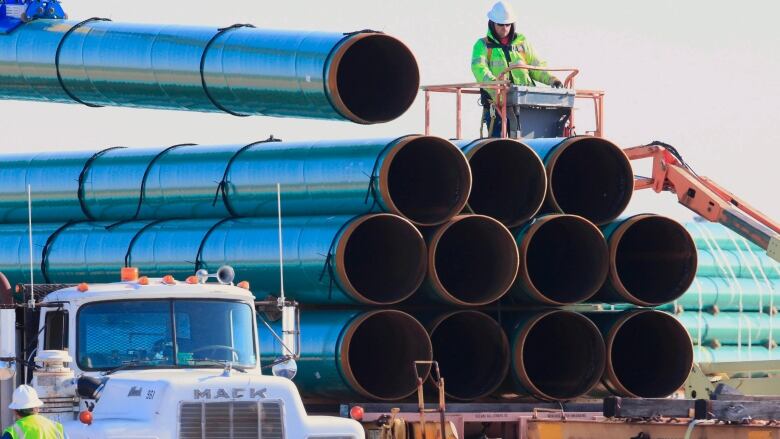Sioux tribes launch legal challenges against completion of Dakota Access pipeline
Developer says work has resumed and pipeline should be operational within 3 months

Two Native groups the Standing Rock Sioux and theCheyenne River Sioux have launched last-minute court challenges in an attempt to block final completion of the Dakota Access pipeline in North Dakota.
The legal moves comeafter the U.S. army granted Energy Transfer Partners formal permission Wednesday to lay pipe under LakeOahe, clearing the way for completion of the 1,900-kilometre, $3.8 billion US pipeline.
"This administration (of President Donald Trump) has expressed utter and complete disregard for not only our treaty
and water rights, but the environment as a whole," the Standing Rock Sioux tribe said in a statement posted on their website.
Meanwhile, the Cheyenne River Sioux, filed their challenge in federal court in Washington, D.C., askinga federal judge to stop the Lake Oahe work while a lawsuit filed earlier by the two tribes against the pipeline proceeds. Attorney Nicole Ducheneaux said in court documents that the pipeline "will desecrate the waters upon which Cheyenne River Sioux tribal members rely."
ETP spokeswoman Vicki Granado confirmed early Thursday that construction resumed "immediately after receiving the easement" from the army. The company said the full pipeline should be operational within three months
Work has been stalled for months due to opposition by the Standing Rock Sioux and a prolonged court battle between the developer and the Army Corps of Engineers that oversees the federal land where the last segment of the pipeline will be laid. But President Donald Trump last month instructed the Corps to advance pipeline construction.
An encampment near the construction site has drawn thousands of protesters in support of the Standing Rock Sioux since April, leading on occasions to clashes with law enforcement and hundreds of arrests. Tribal Chairman Dave Archambault said in a statement that the tribe is prepared to keep up the battle "in the courts."
"We will continue to fight against an administration that seeks to dismiss not only our treaty rights and status as sovereign nations, but the safe drinking water of millions of Americans," the chairman said.
The tribe fears a leak in the pipeline could contaminate drinking water at its reservation that is just downstream from the proposed Missouri River crossing. ETP says the pipeline will be safe.
In a statement Wednesday, North Dakota Gov. Doug Burgum urged "co-operation and restraint" from all parties and requested federal law enforcement assistance to keep the peace during construction that would transport North Dakota oil across four states to a shipping point in Illinois.
Protesters rallied in several cities across the country Wednesday. Demonstrators in Chicago targeted a bank. Others went to an Army Corps of Engineers office in New York City but were asked to leave when they started filming without a permit. Several people were arrested for blocking public access to a federal building in San Francisco.
Joye Braun and Payu Harris, two pipeline opponents who have been at the North Dakota encampment that's been the focus of the pipeline battle since April, said in an interview at a nearby casino that there's frustration but also resolve in the wake of the army's decision.
"The goal is still prayerful, nonviolent direct action," Braun said.
The tribe maintains the decision violates its treaty rights, and its attorneys have vowed to keep fighting in court.
The Corps has notified protesters still at the encampment that the government-owned land will be closed Feb. 22. But according to Harris, a new camp is being established on private land.
"This is not over. We are here to stay. And there's more of us coming," he said.
An assessment conducted last year determined the river crossing would not have a significant effect on the environment. However, the army in December decided further study was warranted to address tribal concerns.
The Corps launched an environmental impact study on Jan. 18, but Trump signed an executive action six days later telling the Corps to allow the company to proceed with construction.
Workers earlier drilled entry and exit holes for the crossing, and oil has been put in the pipeline leading up to the lake in anticipation of finishing the project. CEO Kelcy Warren has said Energy Transfer Partners could complete the pipeline in about three months.
with files from Reuters












_(720p).jpg)


 OFFICIAL HD MUSIC VIDEO.jpg)
.jpg)



























































































